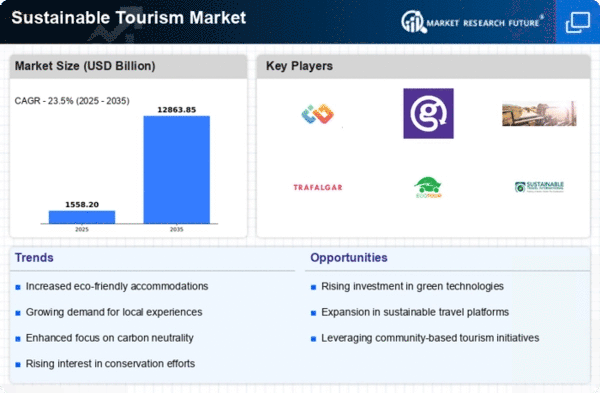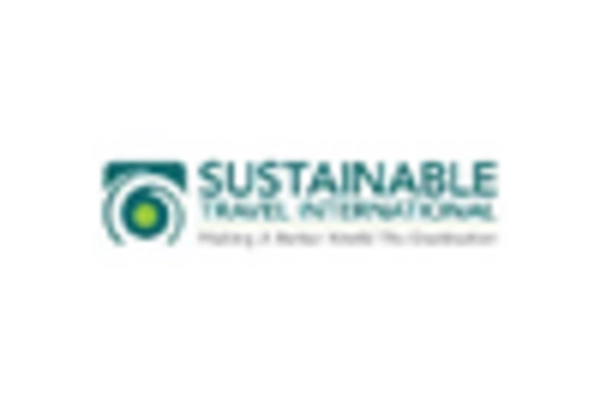Market Trends
Introduction
As we enter the year 2024, the sustainable tourism market is increasingly influenced by macro-factors that are reshaping the travel and hospitality industry. Technological developments such as the rise of digital platforms and eco-friendly innovations are enabling more sustainable travel practices. Meanwhile, the regulatory environment is becoming more demanding as governments and international organisations around the world implement stricter environmental policies to reduce carbon emissions and promote responsible tourism practices. As for the consumers, they are demanding more sustainable travel experiences. These trends are strategically important to industry players because they not only align with the global sustainable development goals but also offer opportunities to differentiate and gain a competitive advantage in a rapidly evolving marketplace.
Top Trends
-
Increased Demand for Eco-Friendly Accommodations
Moreover, there is a growing preference for eco-friendly accommodation, and of the travellers who have indicated their preference, seven out of ten would pay more for a sustainable establishment. The major hotel chains are investing in certification and energy-saving technology. For example, the Hilton Group has set itself a target of reducing its carbon footprint by 61% by 2030. This trend is reshaping hotel strategies and encouraging them to adopt sustainable practices. There is a prospect of stricter regulation of sustainable standards in the future. -
Rise of Carbon Offset Programs
Carbon offset programmes are now essential. A full 45 per cent of travellers are prepared to pay to offset their carbon emissions. The Expedia Group has introduced offset programmes into its booking process. The trend towards a ‘greener’ travelling public has led the major airlines and travel agencies to enter into partnership with a range of environmental groups. Among the operational results is greater transparency in reporting on emissions. And in the long term, the industry is likely to be subject to compulsory carbon offsetting legislation. -
Local Community Engagement Initiatives
In recent years, the interest in the environment has increased, and today, 60% of tourists are looking for local, authentic experiences that benefit local communities. Hence, companies like Intrepid Travel offer a direct link to the local economy. This new trend encourages sustainable practices and promotes intercultural exchange. Operationally, this entails a partnership with local businesses. The future will see more and more governments supporting the community-based tourism industry. -
Sustainable Transportation Options
The traveller’s preferences for transport are changing, with more than half of those surveyed preferring to use eco-friendly transport. Consequently, major tour operators like TUI are investing in electric buses and trains for their tours. This is influencing the logistics and the transport system is becoming more green. In the future, transport companies that operate in the tourism industry may be subject to stricter emissions regulations. -
Digital Nomadism and Remote Work Travel
The rise of the digital nomads, in the wake of the spread of the remote workforce, has meant that a third of remote workers are planning to travel while working. As a result, companies like AirBnB are now offering long-term stays. This is affecting accommodation strategies and encouraging the development of co-working spaces in tourist destinations. In the future, we may see a rise in bespoke services for remote workers. -
Focus on Wildlife Conservation Tourism
Among the forty per cent of travellers who are interested in conservation tourism, forty per cent are prepared to pay for it. The travel companies such as G Adventures are offering trips which help to protect the environment. The trend is reshaping the choice of itineraries and encouraging responsible interactions with animals. The practical implications include the need to establish a partnership with conservation groups. The long-term implications are likely to include a tightening of regulations on the use of animals for tourism. -
Health and Safety Sustainability Standards
Post-pandemic, hygiene and safety have become a matter of utmost importance, and some 55 per cent of travellers make hygiene the prime consideration in choosing their route. The result is that cleaning companies like Marriott International have stepped up their game. This trend is influencing industry standards. And it is quite possible that, in the future, certification for hygiene and safety of tourist services will become a universal thing. -
Culinary Tourism and Local Sourcing
Food tourism is growing in popularity. Today, sixty-five per cent of travellers seek out gastronomic experiences. Companies like the one that offers sustainable travel promote the local cuisine and local suppliers. This trend is influencing the catering industry, which is establishing closer ties with local farmers. Future developments may include an increased demand for transparency in food production. -
Technology-Driven Sustainable Solutions
The technological aspect is also of great importance in the promotion of the concept of sustainable development. Fifty per cent of travel operators are investing in digital solutions to improve their green credentials. Artificial intelligence is being used to help optimize itineraries with the lowest possible carbon footprint. This trend is reshaping the operational side and is promoting innovation in the field of sustainable practices. In the future, we may see the emergence of new start-ups specializing in sustainable tourism. -
Regenerative Tourism Practices
Regenerative tourism is a growing trend, with 35% of travelers seeking experiences that restore the environment. Cox & Kings, for example, is developing tours that contribute to the regeneration of the environment. The trend is influencing product development, with a shift from sustainable to regenerative. It could also lead to industry standards for regenerative practices.
Conclusion: Navigating the Sustainable Tourism Landscape
Competition is becoming increasingly fragmented in the sustainable tourism market, with both the old and new entrants competing for market share with their own particular strategies. The regional trends indicate that there is a growing demand for sustainable tourism. The travel industry is responding to this trend by re-positioning itself with a sustainable focus. The old players are using their existing brand equity to leverage their established customer relationships and to enhance their operations and experiences by deploying new digital tools. The new entrants are focusing on flexibility and niche market segments, and are using digital tools to offer a broader range of bespoke travel solutions. The ability to exploit the potential of artificial intelligence, to automate and to maintain a strong commitment to sustainable practices will be key to future success. This will be essential for those wishing to take advantage of the opportunities offered by this growing market.


















Leave a Comment